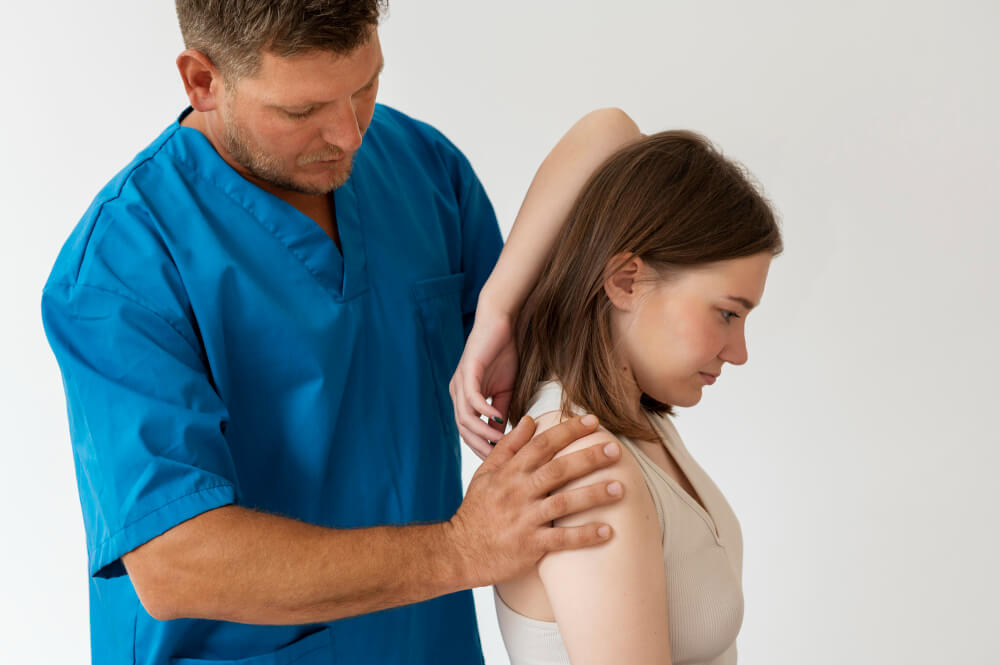Bumped Your Shoulder? Understanding Treatment Options for Shoulder Contusions
The shoulder joint is a complex structure, allowing for a remarkable range of motion. It comprises bones, muscles, ligaments, and tendons that work together to facilitate various movements. However, a fall, collision, or direct impact to the shoulder can damage these soft tissues, leading to a shoulder contusion, essentially a bruise. Shoulder contusions are relatively common and often heal effectively with proper care.
Recognizing a Shoulder Contusion: Symptoms and Diagnosis
Classic Signs of a Shoulder Contusion:
- Pain: The most common symptom is pain in the affected area, often described as sharp or throbbing. The pain might worsen with movement.
- Tenderness: The area around the contusion will be tender to the touch.
- Swelling: Inflammation and swelling around the shoulder joint are common after a contusion.
- Bruising: Discoloration of the skin, ranging from blue to purple, might appear within a day or two after the injury.
- Limited Range of Motion: Moving the shoulder might be difficult or painful due to pain and swelling.
Seeking Medical Attention:
While most shoulder contusions can be managed at home with self-care measures, consulting a doctor is recommended if:
- The pain is severe and doesn’t improve with rest and over-the-counter pain medication.
- You experience significant swelling or bruising around the shoulder.
- You have difficulty moving your shoulder or notice a loss of strength.
- You suspect you might have a fracture in addition to a contusion.
- During a consultation, the doctor will inquire about the nature of your injury and perform a physical examination to assess the extent of the contusion. Imaging tests like X-rays might be ordered to rule out a fracture or other underlying injuries.
Treatment Options for Shoulder Contusions: Promoting Healing and Regaining Comfort
The RICE Method:
The cornerstone of treatment for most shoulder contusions is the RICE method, which stands for:
- Rest: Avoid activities that aggravate the injury. This might involve limiting overhead movements or wearing a sling for support during the initial healing phase.
- Ice: Apply ice packs to the affected area for 15-20 minutes at a time, several times a day, to reduce pain and inflammation.
- Compression: Wrap the shoulder with a compression bandage to minimize swelling.
- Elevation: Elevate the injured shoulder above your heart as often as possible to promote healing and reduce swelling.
Pain Management:
Over-the-counter pain relievers like ibuprofen or acetaminophen can help manage pain and discomfort associated with the shoulder contusion.
Physical Therapy:
Once the initial inflammation subsides, physical therapy can play a crucial role in regaining full range of motion and strengthening the muscles surrounding the shoulder joint. A physical therapist will design a personalized exercise program to improve flexibility and strength, promoting long-term shoulder health.
Recovering from a Shoulder Contusion: Tips for a Speedy Return to Activity
Gradual Return to Activities:
Resume your regular activities gradually as your pain subsides and your range of motion improves. It’s crucial to listen to your body and avoid strenuous activities that might aggravate the injury.
Maintaining Good Posture:
Maintain good posture while recovering from the contusion. This helps the shoulder heal properly and prevents further strain on the injured tissues.
Applying Heat Therapy:
Once the initial inflammation resolves, applying heat therapy with a heating pad or warm compress can help promote healing and improve flexibility.
Stretching and Strengthening Exercises:
Regular gentle stretching and strengthening exercises prescribed by a physical therapist can help improve flexibility and strength in the shoulder joint, promoting long-term pain-free movement.


